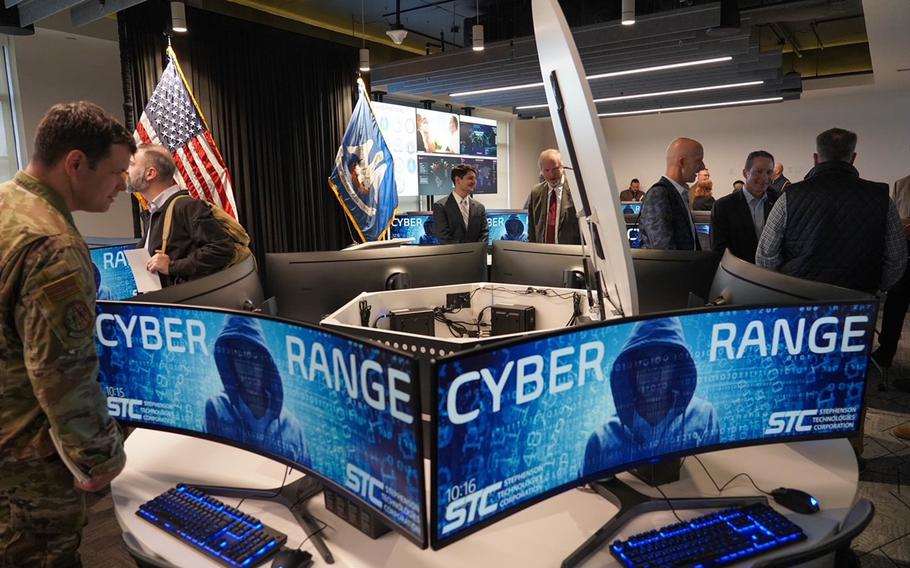
The Stephenson Technologies Corporation hosts a ribbon cutting ceremony for the new Joint Cyber Range and Training Center on the Water Campus in Baton Rouge, La., Feb. 1, 2022. (Louisiana National Guard)
(Tribune News Service) — At the heart of LSU’s mission as a university lies the Scholarship First Agenda, focused on improving the school through concerted efforts in five key areas.
One of those areas, defense, has seen a growth in investment over the past year through cybersecurity and strategic partnerships.
But one of LSU’s most important institutions is, according to its CEO, not often talked about.
Since 2015, LSU has owned and operated the Stephenson Technologies Center, a nonprofit contractor providing solutions within America’s most prominent national security institutions like the U.S. Department of Defense.
“I think the thing that most people don’t know is that this exists, the STC exists,” said James Olson, president and CEO of Stephenson Technologies Center. “You can point to all kinds of processes that keep that from happening, but at the end of the day, not enough people know this exists and that they can use it.”
Olson, who took over the role as CEO and president last month, said the center was created in 2015 with the purpose of serving LSU and tying its focus on defense to the university’s research capabilities.
“We’re assigned to bridge the gap between the high-impact research that happens at LSU by faculty and staff and then we bring it out with the intent of supporting, informing and delivering that research through the technology innovation pipeline to national security related customers,” he said.
National security customers of the STC include the U.S. Department of Homeland Security, Intelligence Community and other federal outlets. The center works closely with these markets, Olson said, to improve LSU’s standing as a cybersecurity leader.
Working with the U.S. Air Force, Olson said the STC helps small businesses “understand the threat environment of the cybersecurity world.”
“To allow these small businesses to build some kind of protection envelope around them, to be able to still be good suppliers to the Air Force,” he said. “The Air Force is worried that if there’s a really bad cyber event going on, does that shut down their supply chain and all the small businesses that support their supply chain? The Air Force invested in creating this capability to help small businesses.”
In collaboration with the U.S. Navy, the STC developed a program to build and deliver a “common operational picture,” which moderates data from radar, drones with visual cameras and other sensor systems.
“If you have three of these sensors going on, could you figure out whether all of them are looking at the same thing and telling me about one thing or are they telling me about three things or two things?” he said. “So we built this system with the Navy to help de-conflict that common operational picture of multiple sensors looking at stuff by getting all that data brought in, aggregating that data, doing analytics and providing a decision to somebody that needs to understand what they’re looking at.”
While many other universities have ties to defense, including 14 special University Affiliated Research Centers that work directly with the U.S. military, Olson said the work LSU helps with providing national security solutions is not all that common.
“I won’t say it’s rare, but it’s not completely normal either,” he said. “A majority of the universities don’t have a security institute, so to speak.”
Along with Olson taking over as CEO in October, former STC senior program manager Tiffany Galasso was named its chief operating officer and took over the role Sept. 1.
Brien Dickson, former professor of Naval Science at Southern University, joined STC in September to replace Galasso as executive director of programs.
With new leadership setting a course for its future, Olson said the STC is committed to increasing its staff from 22 people to around 50 over the next two years and retaining cybersecurity talent within Louisiana.
“The vision of the organization is to help create this research portfolio delivery vehicle that can then create economic growth for the state of Louisiana and actually create a future home for graduating students to have high-tech paying jobs,” Olson said. “One of our long-range goals is to be a place where we can grow double or triple the size over time to have LSU students come here and work after they graduate. They can get a high-tech paying job that’s doing something that’s delivering mission impact to our nation’s national security problems.”
(c)2023 The Times-Picayune | The New Orleans Advocate
Visit www.nola.com
Distributed by Tribune Content Agency, LLC.